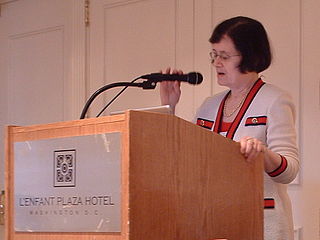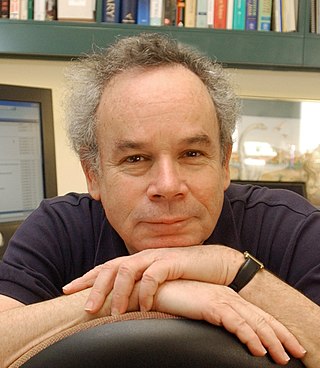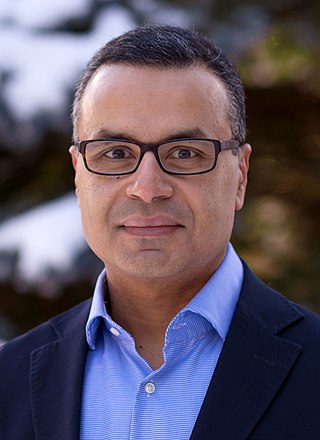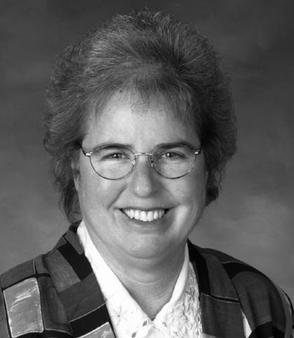Related Research Articles

Frederick Phillips Brooks Jr. was an American computer architect, software engineer, and computer scientist, best known for managing the development of IBM's System/360 family of computers and the OS/360 software support package, then later writing candidly about those experiences in his seminal book The Mythical Man-Month.

Ronald Linn Rivest is a cryptographer and computer scientist whose work has spanned the fields of algorithms and combinatorics, cryptography, machine learning, and election integrity. He is an Institute Professor at the Massachusetts Institute of Technology (MIT), and a member of MIT's Department of Electrical Engineering and Computer Science and its Computer Science and Artificial Intelligence Laboratory.

Barbara Bluestein Simons is an American computer scientist and the former president of the Association for Computing Machinery (ACM). She is a Ph.D. graduate of the University of California, Berkeley and spent her early career working as an IBM researcher. She is the founder and former co-chair of USACM, the ACM U.S. Public Policy Council. Her main areas of research are compiler optimization, scheduling theory and algorithm analysis and design.
Peter Pin-Shan Chen is a Taiwanese American computer scientist. He is a (retired) distinguished career scientist and faculty member at Carnegie Mellon University and Distinguished Chair Professor Emeritus at LSU. He is known for the development of the entity–relationship model in 1976.

David A. Bader is a Distinguished Professor and Director of the Institute for Data Science at the New Jersey Institute of Technology. Previously, he served as the Chair of the Georgia Institute of Technology School of Computational Science & Engineering, where he was also a founding professor, and the executive director of High-Performance Computing at the Georgia Tech College of Computing. In 2007, he was named the first director of the Sony Toshiba IBM Center of Competence for the Cell Processor at Georgia Tech.

Avi Silberschatz is an Israeli computer scientist and researcher. He finished high school at the Hebrew Reali School in Haifa, and graduated in 1976 with a Ph.D. in computer science from the State University of New York (SUNY) at Stony Brook. His research interests include database systems, operating systems, storage systems, and network management.

Willy Susilo is an Australian cybersecurity scientist and cryptographer. He is a Distinguished Professor at the School of Computing and Information Technology, Faculty of Engineering and Information Sciences University of Wollongong, Australia.
John Chi-Shing Lui is a Hong Kong computer scientist. He was the chairman of the Department of Computer Science & Engineering in the Chinese University of Hong Kong. He received his Ph.D. in computer science from UCLA. When he was a Ph.D. student at UCLA, he spent a summer working in IBM's Thomas J. Watson Research Center. After his graduation, he joined the IBM Almaden Research Laboratory/San Jose Laboratory and participated in various research and development projects on file systems and parallel I/O architectures. He later joined the Department of Computer Science and Engineering at the Chinese University of Hong Kong. For the past several summers, he has been a visiting professor in computer science departments at UCLA, Columbia University, University of Maryland at College Park, Purdue University, University of Massachusetts Amherst and Universita' degli Studi di Torino in Italy.

Frances Elizabeth Allen was an American computer scientist and pioneer in the field of optimizing compilers. Allen was the first woman to become an IBM Fellow, and in 2006 became the first woman to win the Turing Award. Her achievements include seminal work in compilers, program optimization, and parallelization. She worked for IBM from 1957 to 2002 and subsequently was a Fellow Emerita.

Moshe Ya'akov Vardi is an Israeli mathematician and computer scientist. He is the Karen Ostrum George Distinguished Service Professor in Computational Engineering at Rice University, United States. and a faculty advisor for the Ken Kennedy Institute. His interests focus on applications of logic to computer science, including database theory, finite model theory, knowledge of multi-agent systems, computer-aided verification and reasoning, and teaching logic across the curriculum. He is an expert in model checking, constraint satisfaction and database theory, common knowledge (logic), and theoretical computer science.

Ronald Fagin is an American mathematician and computer scientist, and IBM Fellow at the IBM Almaden Research Center. He is known for his work in database theory, finite model theory, and reasoning about knowledge.
Hsinchun Chen is the Regents' Professor and Thomas R. Brown Chair of Management and Technology at the University of Arizona and the Director and founder of the Artificial Intelligence Lab. He also served as lead program director of the Smart and Connected Health program at the National Science Foundation from 2014 to 2015. He received a B.S. degree from National Chiao Tung University in Taiwan, an MBA from SUNY Buffalo and an M.S. and Ph.D. in Information Systems from New York University.
Dr Ahmed K. Elmagarmid is a computer scientist, academic and executive. He is the founding executive director of Qatar Computing Research Institute, a national research institute under Hamad bin Khalifa University, a member of the Qatar Foundation for Education, Science and Community Development. Since his appointment in 2010, Elmagarmid has focused on large-scale computing challenges that address national priorities for growth and development of Qatar. The computer research community, especially the database research recognizes the important role he has played at international level by creating data-centric research institution like QCRI and building it into an internationally reputed research institute.
Laura M. Haas is an American computer scientist noted for her research in database systems and information integration. She is best known for creating systems and tools for the integration of heterogeneous data from diverse sources, including federated technology that virtualizes access to data, and mapping technology that enables non-programmers to specify how data should be integrated.
Anupam Joshi is the Oros Family Professor and Acting Dean of the UMBC College of Engineering and Information Technology in the University of Maryland Baltimore County, Baltimore, MD, USA. He is also the Director of the UMBC Center for Cybersecurity.
Elena Ferrari is a Professor of Computer Science and Director of the STRICT Social Lab at the Università degli Studi dell’Insubria, Varese, Italy. Ferrari was named Fellow of the Institute of Electrical and Electronics Engineers (IEEE) in 2013 for contributions to security and privacy for data and applications. She has been named one of the “50 Most Influential Italian Women in Tech” in 2018. She was elected as an ACM Fellow in 2019 "for contributions to security and privacy of data and social network systems".

Ihab Francis Ilyas is a computer scientist who works in data science. He is currently a professor of computer science in the David R. Cheriton School of Computer Science at the University of Waterloo. He also led the Knowledge Platform team at Apple Inc. Ihab is the holder of the Thomson Reuters-NSERC Industrial Research Chair in Data Cleaning at the University of Waterloo.

Joan Laverne Mitchell was an American computer scientist, data compression pioneer, and inventor who, as a researcher at IBM, co-invented the JPEG digital image format.

Eugene Wong is a Chinese-American computer scientist and mathematician. Wong's career has spanned academia, university administration, government and the private sector. Together with Michael Stonebraker and a group of scientists at IBM, Wong is credited with pioneering database research in the 1970s from which software developed by IBM, Microsoft, and Oracle descends. Wong retired in 1994, since then holding the title of Professor Emeritus of Electrical Engineering and Computer Sciences at University of California, Berkeley.
Natalie Dana Enright Jerger is an American computer scientist known for research in computer science including computer architecture and interconnection networks.
References
- ↑ Elisa Bertino Purdue Homepage
- 1 2 Winslett, Marianne (June 2010), "Elisa Bertino Speaks Out on How She Accrued 301 Coauthors, Revitalized a Department, Cut Her Commute to Three Minutes, Enhanced Our Trust in Shared Data, and More" (PDF), SIGMOD Record, 39 (2): 51–57, doi:10.1145/1893173.1893182, S2CID 26392139, archived from the original (PDF) on 2016-03-04.
- ↑ Elisa Bertino at DBLP Bibliography Server
- 1 2 Biosketch Archived 2015-06-19 at the Wayback Machine , 2013, retrieved 2015-06-16.
- ↑ IEEE Fellows directory, accessed 2015-06-16.
- ↑ ACM Fellow award citation, retrieved 2015-06-16.